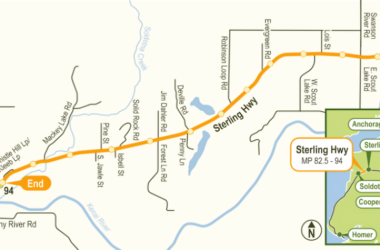JUNEAU, Alaska (AP) — The state wants the Alaska Supreme Court to reverse a lower court ruling that cleared the way for independents to run in Democratic party primaries — an issue with implications for this year’s elections.
In arguments before the court Thursday in Kenai, Laura Fox, an assistant attorney general, said it would be “confusing and also deceptive” to call a candidate nonpartisan if that person is a nominee for a political party. Independent is a general term that describes individuals who are registered as nonpartisan or undeclared.
The court did not immediately rule.
The Alaska Democratic Party had challenged a state law requiring that primary election candidates be registered members of the party whose nomination they’re seeking. Superior Court Judge Philip Pallenberg sided with the party, saying the state was restricting the party’s attempt to appeal to independent voters by not allowing unaffiliated candidates to participate in Democratic primaries.
The decision only applies to the Democratic primary, since that party changed its rules to embrace independent candidates.
Justices asked Fox if there was harm in letting the party allow independent candidates. Justice Susan Carney asked why the state cares.
It could be a self-destructive policy for the party, Carney said. “But if they’ve chosen to do that, why not let them self-destruct?”
The state, in court filings, contends that if a party nominee doesn’t have to identify with their nominating party, the system used by the state to regulate political party status and ballot access “will cease to make sense, party labels will be uninformative, and parties will lose coherence.” Fox reiterated those points Thursday.
“It’s confusing and also deceptive to call somebody nonpartisan when they’re a party nominee, because that is not what they are,” Fox said. “They are not nonpartisan if they’re a party nominee.”
Jon Choate, an attorney for the Democratic Party, said the support that candidates get when a party is behind them can be significant, affecting fundraising and providing access to people knowledgeable about campaigns. It’s important for independents to have access to that, if a party is willing, because it improves their chances of being elected, he said.
“And I think that’s going to have a moderating influence,” he said. “I don’t think it will destroy the two-party system but I do think it will make it less partisan.”
So far, at least one candidate plans to run as an independent in a Democratic primary — Alyse Galvin, who is running for a U.S. House seat. Two others, Dimitri Shein and Gregory Jones, also plan to seek the party’s nomination, as Democrats.
The seat is held by Republican Rep. Don Young, who is seeking re-election.
If the high court reverses Pallenberg’s decision, candidates who filed to run as independents in the Democratic primary would be “de-certified” and have to refile in a manner for which they’re eligible, according to the Division of Elections. For independents, that would mean having to gather signatures to qualify for the general election ballot and bypass the primary process altogether.
Gov. Bill Walker changed his party affiliation from Republican to undeclared in joining with Democrat Byron Mallott as part of a so-called unity ticket in 2014. In announcing his re-election bid, Walker said the two planned to go the signature-gathering route.
A Democrat has yet to file for the governor’s race. The filing deadline is June 1.
Politically unaffiliated voters — those labeled as “undeclared” or “nonpartisan” — comprise the largest voting bloc in the state. Anyone, regardless of party affiliation, can vote in the Democratic primary.
Democrats initially sued ahead of the 2016 U.S. Senate race. But that challenge was tossed as premature because it was brought before the Democrats had formally adopted a party rule allowing politically unaffiliated candidates to run in its primaries.






